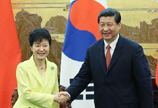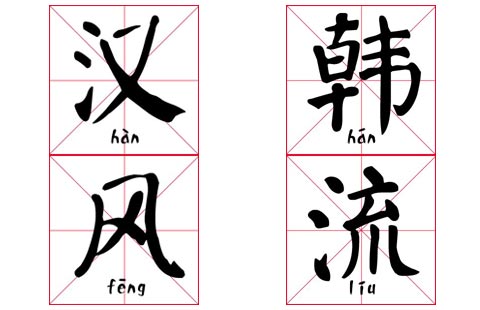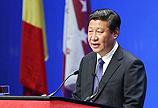China and S. Korea for richer and safer Asia
Updated: 2014-07-03 11:04
(Xinhua)
Comments Print Mail Large Medium SmallBEIJING - Chinese President Xi Jinping travels to South Korea on Thursday for a state visit that has drawn the limelight from across the world and spawned a welter of interpretations and speculations.
|
 Xi starts two-day visit to Republic of Korea |
Now in view of the huge potential yet to be tapped in their regionally beneficial economic cooperation, as well as the alarming bubbling-up of security tension in their neighborhood, it is high time that Beijing and Seoul further closed ranks to both pursue and safeguard common development.
On the economic front, bilateral win-win cooperation has made remarkable strides forward. The pair have become each other's major trading partner and investor, with two-way trade shooting up to more than 270 billion US dollars in 2013.
Yet they can do more and better. Their economies highly complementary and increasingly intertwined, they should seize the momentum to reach a free trade agreement as soon as possible, which will inject fresh vigor into not only their own development but also regional growth.
Meanwhile, without a stable and favorable environment, advancement on the economic track would be unsustainable -- a stark reality that demands the two heavyweight players live up to their shared and inescapable responsibility in maintaining regional tranquility.
The task is daunting. Despite vehement domestic opposition and pronounced international concern, Japan's nationalist prime minister, Shinzo Abe, has just gutted his country's pacifist constitution and betrayed his nation's pacifist soul with a constitutional reinterpretation that allows Japanese forces to fight abroad.
The radical turnabout from Tokyo's long-standing postwar security posture poses a grave menace to regional stability, particularly given Japan's past aggressions, Abe's unrepentant historical attitude, his increasing bellicosity in territorial disputes, and his connivance in the revival of the devilish militarism that once wrecked Asia and devoured Japan itself.
In addition to Abe's Faustian flirtation with the specter of war, the neighborhood is also pestered with simmering tension on the Korean Peninsula. Recent war games and missile tests have only stoked the flames.
The crux of the chronic Korean Peninsula predicament lies in the mutual distrust and hostility between the Democratic People's Republic of Korea (DPRK) and the Untied States. Washington's counterproductive obsession with sanctions and intimidation and Pyongyang's understandable sense of insecurity and unhelpful violations of UN resolutions have only exacerbated the feud.
Notwithstanding, China and South Korea are natural and major stakeholders in the Korean Peninsula issue, which concerns the core interest of both countries. Besides, a nuclear-free and peaceful Korean Peninsula is what all nations in the region deserve but have awaited far too long.
Against such a gloomy background, it is highly advisable and imperative that Seoul work hand in hand with Beijing to enhance coordination in regional affairs and pool their wisdom and resources so as to help arrest security hazards, defuse tension, build trust and foster a geopolitical environment conducive to development.
The Chinese president's visit presents the two strategic partners with a timely and significant opportunity to align themselves on the same page and open a new chapter in bilateral all-round cooperation. For the sake of their own and the broader Asia, they should make the most and best of it.




